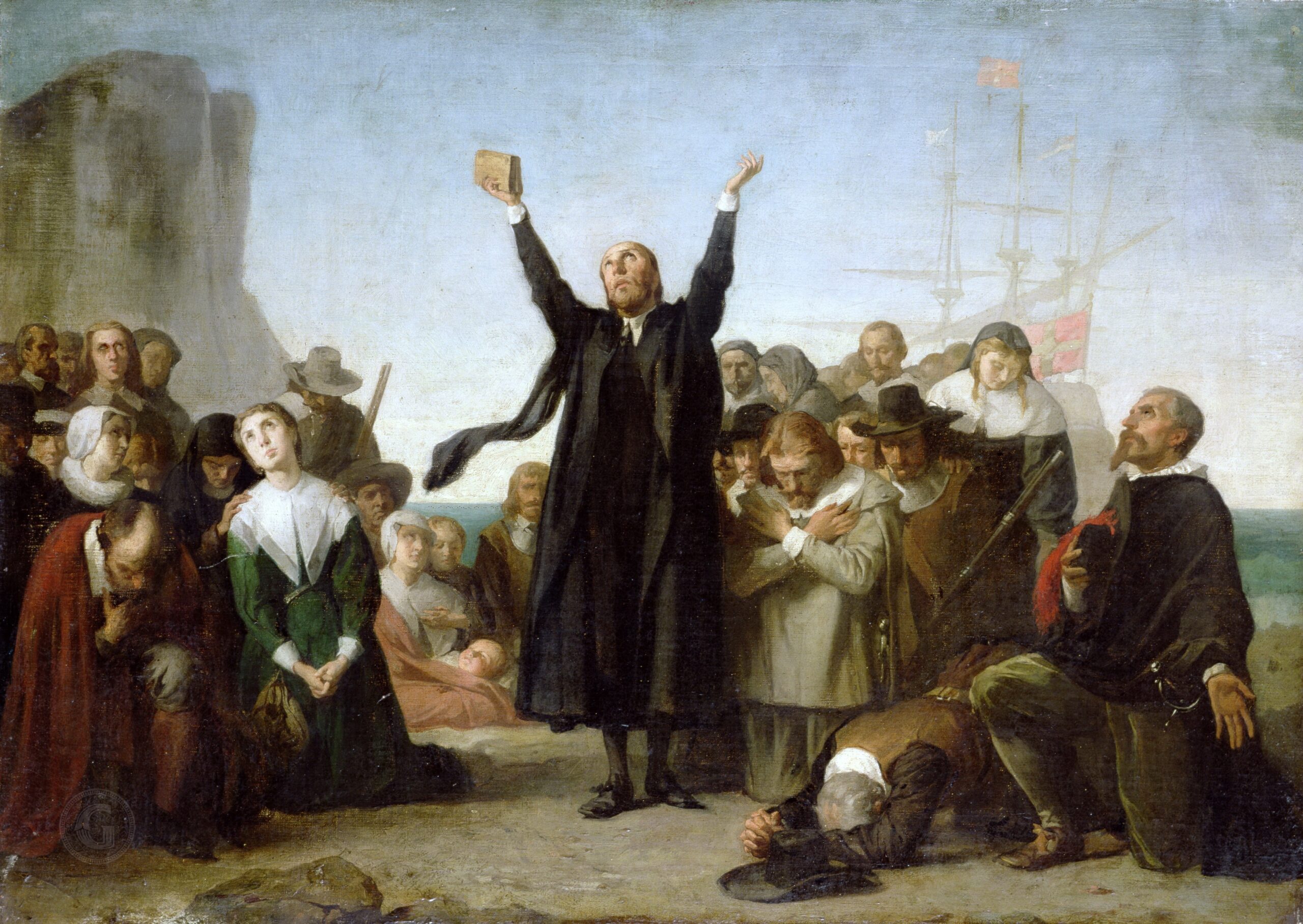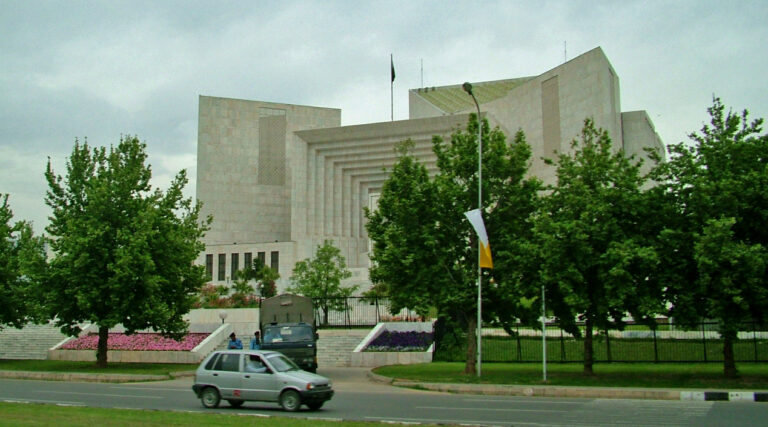
A Religious “Delaware”: Establishing a State Haven for Religious Corporations
Ian Speir
The Arrival of Pilgrim Fathers by Antonio Gisbert (Public Domain)
Protections for the religious freedom and internal affairs of religious organizations are largely a matter of judge-made First Amendment law. While the Supreme Court has acted to protect institutional religious freedom in important cases, many American jurisdictions take a narrow view of this right and have acted to diminish protections for religious speech and exercise. In this environment, freedom-loving states should step up to protect and enhance institutional religious freedom. Drawing on the example of Delaware as the state of choice for business corporations, this essay proposes establishing a state haven for religious organizations and suggests that the law of such a haven state should exhibit the following seven features:
- Allowing religious entities to organize specifically as religious corporations;
- Maximum flexibility to ensure that corporate structure and governance align with the unique doctrines, values, and polity of religious organizations;
- A specialized court system, similar to Delaware’s Court of Chancery, staffed by judges who are expert in corporate law as well as the law of religious freedom;
- Imposition of special taxes and fees to pay for this specialized system of law;
- Codification of an internal affairs doctrine that requires respect for the autonomy of religious organizations and deference to their internal decisions;
- A “Religious Judgment Rule”—a rebuttable presumption that a given corporate action is essential to the organization’s religious mission; and
- A requirement of free exercise equality, i.e., equal treatment of comparable religious and nonreligious activities.
These seven features, while not an exhaustive list, would make a particular state attractive to religious organizations as a place to both incorporate and operate. A state haven would ensure the freedom of religious institutions to organize and act in accordance with their faith commitments, provide a uniform set of rules and standards by which they are governed, and impart stability and predictability to their operations nationwide.
The Delaware Example: Why businesses incorporate in Delaware
Delaware has long been a haven for business corporations (§ 1:28), which often prefer Delaware because of its low cost, favorable taxes, ease of corporate administration, and a court system—the Court of Chancery—dedicated to Delaware corporate law and staffed by judges with specialized expertise. Commentators often single out the Chancery Court as the most important factor in Delaware’s success as a corporate haven.
Delaware’s success is bolstered by a choice-of-law principle known as the internal affairs doctrine (“IAD”).The IAD recognizes that only one state should have the authority to regulate a corporation’s “internal affairs.” Thus (§ 4223.50), “internal matters of corporate governance are governed by the law of the state of incorporation,” except in “unusual case[s].”
“By providing certainty and predictability, the internal affairs doctrine protects the justified expectations of the parties with interests in the corporation.”
The IAD is animated by constitutional principles, including the Due Process Clause (so directors and officers know in advance the law that will govern their conduct and decisions), the Full Faith and Credit Clause (which “commands application of the internal affairs doctrine except in … rare circumstance[s]”), and the Commerce Clause. Internal affairs covered by the IAD (§ 4223.50) “include those matters that are peculiar to the relationships among or between the corporation and its officers, directors and shareholders,” such as dividend payments, shareholder voting rights, and procedural requirements in shareholder derivative actions. “[T]he practice of both state and federal courts has consistently been to apply the law of the state of incorporation to the entire gamut of internal corporate affairs.”
Some jurisdictions have codified the IAD by statute, applicable to both business and nonprofit corporations. These laws typically disclaim state authority to “regulate the organization or internal affairs of a foreign corporation.”
When applied to protect nonprofit corporations, the IAD has both procedural and substantive components. Procedurally, the doctrine is a choice-of-law rule. It requires a court, no matter where the court is located, to apply the law of the chartering state (that is, the state of incorporation) when the question touches on the corporation’s internal affairs. This rule is rooted in comity and respect for the sovereign authority of the chartering state. Substantively, the doctrine requires judicial deference to the corporation’s own regulation of its internal affairs. That is, it requires a court–again, no matter where it’s located–to respect the autonomy of the corporation to set its own rules, priorities, and standards and to operate in accordance with them.
It’s not only business corporations that require the stability and autonomy conferred by the internal affairs doctrine. Religious organizations need this, too, especially because not all American jurisdictions protect religious freedom to the same degree.
A State Haven for Religious Corporations
The First Amendment accords significant protection to the structure, management, and operations of religious organizations and embodies a special internal affairs doctrine for religious institutions.
But First Amendment protection is largely a matter of judge-made law, and is subject to divergent application by courts across the country. Religious corporations, no less than business corporations, need a state haven, a place where they can incorporate and enjoy clear and consistently-applied statutory protections under state law—protections that apply to the corporation wherever it may operate and according substantial deference to its internal decisions.
This essay suggests that the law of such a haven state should exhibit seven key features.
Religious Corporation as a Legal Entity
The haven state should permit an organization to incorporate specifically as a religious corporation. Several states already have such laws (§§ 1–489), though they tend to be geared toward the incorporation (§§ 5-301 to 5-5-338) of churches as opposed to religious institutions more broadly. As envisioned here, the haven state would permit incorporation for any religious purpose, whether or not the corporation is associated with a church or other religious body.
Maximum Flexibility
The haven state’s law should permit maximum flexibility with respect to corporate structure and governance, thereby permitting the religious corporation to structure its affairs to align with its own doctrines, values, and polity. This should include the ability to organize a “corporation sole” (a special type of corporation for religious officeholders); to permit any number of directors, members, and officers (including as few as one); to permit directors, members, and officers to reside out of state; and to permit the corporation to affiliate with a church, denomination, or other religious body and subject itself to the constitution, rules, and disciplines thereof. To the extent the law imposes default requirements for articles and bylaws, it should permit the corporation to alter these requirements in its articles and bylaws.
Specialized Court
The haven state should provide for the creation and staffing of a specialized court dedicated to issues of corporate law and the law of religious freedom. (The latter includes the First Amendment, applicable federal statutes that protect religious exercise, and comparable state constitutional and statutory provisions.) This specialized court might be called the Chancery Court, as it is in Delaware. The term “Chancery” refers to a court of equity, whose historical function was to be the “keeper of the king’s conscience.” The haven state Chancery Court proposed here would be responsible to keep the community’s conscience, a function that includes protecting the rights of faith-based institutions. Judges should be appointed to the Chancery Court in accordance with state laws governing the appointment of judges to other state courts, preferably by the governor with consent of the state senate (not, for example, by election).
Fees and Taxes
Because nonprofit corporations are often exempt from many forms of taxation, including income, property, and sales taxes, the haven state may need to impose special fees and taxes on religious and other nonprofit corporations to pay for this specialized system of law. Nonprofit and religious corporations that benefit from the haven state’s protections will be willing to pay into the system in exchange for the corresponding legal and judicial benefits they receive. The law—even the state constitution—should contain protections so that the fee system never becomes oppressive. The system should never become a tool wielded by state legislators or bureaucrats to punish or exact concessions from religious corporations organized in the state. At the same time, the fee system should provide a net benefit to the state, with excess fees dedicated to and earmarked for traditional charitable purposes such as education and care of the poor.
First Amendment-inflected Internal Affairs Doctrine
The haven state should codify the internal affairs doctrine by statute. But the law as codified should be the inverse of the state laws discussed above. Thus, the haven state should require application of its own law whenever a religious corporation’s internal affairs are at issue, even if the dispute is pending in a foreign jurisdiction (i.e., another state court). The foreign jurisdiction would be bound to respect this choice-of-law rule because the Full Faith and Credit Clause of the U.S. Constitution “commands” that the haven state’s law be applied except in “rare circumstance[s].”
The haven state’s law should also robustly protect the autonomy of the religious corporations incorporated there, securing their right to regulate their internal affairs and prescribe their own rules for internal governance. To enact such protection, the haven state need not tread new ground. The First Amendment already protects a religious institution’s ability to organize and govern itself in accordance with its own doctrine, values, and polity. The haven state’s law need only draw upon and explicitly codify these constitutional principles.
The IAD takes on special significance in the context of religious corporations because the First Amendment’s Religion Clauses protect “internal governance” and “internal management decisions that are essential to the institution’s central mission.” Thus, the haven state’s requirement of deference to and respect for a religious corporation’s internal affairs is justified not only by the Due Process, Full Faith and Credit, and Commerce Clauses, but also by the Religion Clauses. Professor Chafee made this point almost a century ago, observing that “autonomy” for “clubs, trade unions, professional associations, secret societies, churches, and educational institutions” promotes “[t]he health of society” as a whole because “the groups within it which serve the industrial, mental, and spiritual needs of citizens are genuinely alive.”
A First Amendment-inflected IAD results in a “stacked” choice-of-law rule, requiring the application first of the haven state’s law and second of the internal law of the religious corporation itself. Imagine, for example, that a plaintiff sues the corporation somewhere other than the haven state where it’s incorporated, and the dispute involves the corporation’s internal affairs. If the foreign state court were to faithfully apply the IAD, it first would conclude that, under choice-of-law principles, the law of the haven state must be applied. Then, applying the haven state’s law, the court would conclude that it must defer to and respect the autonomy of the religious corporation regarding its own internal affairs.
The haven state could even have a state official—the “Solicitor of the Chancery”—that advocates for haven-state corporations around the country, as intervenor, amicus, or otherwise.
The effect would be to project the haven state’s law nationally, ensuring critical protections for religious corporations wherever they may operate. Right now, as noted, these protections are largely a matter of judge-made First Amendment law, which can vary widely from jurisdiction to jurisdiction. But the Full Faith and Credit Clause and the Religion Clauses, working together under the aegis of the IAD, would command foreign jurisdictions to apply the haven state’s freedom-protecting law.
It remains to be determined what these protected “internal affairs” encompass. The haven state’s law should make clear that a religious corporation’s internal affairs include the following:
- Determination of the corporation’s identity, mission, and values (collectively “Religious Mission”), and the manner of carrying out that mission.
- The relationship among all persons who voluntarily unite themselves to the corporation, including members, directors, officers, employees, and volunteers (collectively “Religious Personnel”).
- The standards of belief and conduct applicable to Religious Personnel, including a requirement that Religious Personnel be faithful to—in the law’s parlance, act as “fiduciaries” of—the corporation’s Religious Mission.
- The application of internal rules governing Religious Personnel and the regulation of their rights and obligations, including meetings, voting, inspection of books and records, expulsion and termination, and internal dispute resolution.
Religious Judgment Rule
In addition to a robust, First Amendment-inflected IAD, the haven state’s law should include a provision requiring deference to a determination by the religious corporation that a particular corporate action, including one involving Religious Personnel, is essential to the Religious Mission and thus presumptively protected against liability. The presumption may be overcome only by a clear and convincing showing of a compelling governmental interest that cannot be advanced by means less restrictive upon free exercise. Such a provision would operate as a kind of “business judgment rule” in the religious context. Call it the Religious Judgment Rule.
Free Exercise Equality
Tandon v. Newsom applies strict scrutiny under the Free Exercise Clause “whenever” a law “treat[s] any comparable secular activity more favorably than religious exercise.” The haven state should codify the Tandon rule by statute, providing that any right, privilege, or benefit provided by state law to a nonreligious organization should be extended on the same terms to religious organizations.
Conclusion
Many of the states in this country were originally founded as havens for religious freedom. James Madison hoped the entire country would be such a haven, “offering an Asylum to the persecuted and oppressed of every Nation and Religion.” But as the nation, its culture, and its laws are changing—in some places becoming hostile to religious freedom and to faith—freedom-loving states must reclaim this noble American heritage. We need a “religious Delaware,” a state committed to hosting, supporting, protecting, and advocating for its chartered religious corporations, wherever they may operate. ♦

Ian Speir is a First Amendment attorney, the founder of Covenant Law in Colorado Springs, and a Senior Legal Fellow with the Religious Freedom Institute. He advises and advocates for religious institutions across the country.
Recommended Citation
Speir, Ian. “A Religious “Delaware”: Establishing a State Haven for Religious Corporations.” Canopy Forum, July 19, 2024. https://canopyforum.org/2024/07/19/a-religious-delaware-establishing-a-state-haven-for-religious-corporations/.
Recent Posts










